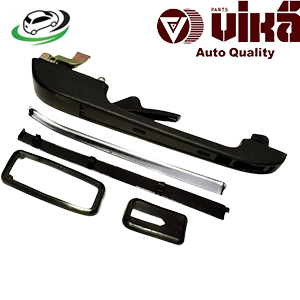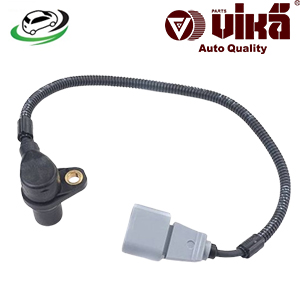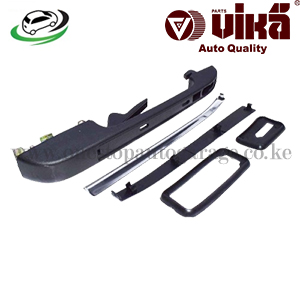-17%
Get Rear Right Door Handle Audi Fox 1.6L / VW Dasher/ Rabbit Pickup/ Quantum/ Rabbit/ Golf/ Jetta 193839206
The rear right door handle is a vital component of a vehicle’s door system, located on the right side of the rear door. It plays a crucial role in the operation, security, and aesthetic appeal of the vehicle. This detailed overview explores the function, construction, common issues, maintenance, and benefits of the rear right door handle.
Function of the Rear Right Door Handle
The rear right door handle has several important functions in a vehicle:
- Passenger Access:
- Convenience: The primary function of the rear right door handle is to provide passengers with a means to open and close the rear right door. This allows for easy entry and exit from the vehicle, particularly in situations where passengers need to access the rear seats.
- Ergonomics: Designed for comfortable use, the handle allows passengers to operate the door with minimal effort.
- Vehicle Security:
- Locking Mechanism: The handle is integrated with the vehicle’s locking system. It enables the door to be locked or unlocked, ensuring that the vehicle’s interior remains secure when not in use.
- Child Safety: Many rear door handles are equipped with child safety locks to prevent young passengers from accidentally opening the door while the vehicle is in motion.
- Aesthetic Integration:
- Design Consistency: The rear right door handle is designed to match the vehicle’s overall aesthetic. It contributes to the vehicle’s exterior styling, ensuring that the handle complements the vehicle’s design.
- Durability and Functionality:
- Weather Resistance: The handle is built to withstand various weather conditions, including rain, snow, and extreme temperatures, ensuring reliable operation throughout the year.
- Ease of Operation: The handle is designed to provide smooth operation, facilitating easy opening and closing of the door.
Construction of the Rear Right Door Handle
The rear right door handle is constructed from several key components:
- Handle Assembly:
- Material: Typically made from high-strength plastic, metal, or a combination of both, the handle is designed for durability and resistance to wear. The choice of material affects both the handle’s strength and its resistance to environmental factors.
- Shape and Design: The handle is ergonomically designed to ensure ease of use. It may feature a lever or grip design that allows for comfortable operation.
- Mounting Bracket:
- Support Structure: The handle is attached to the door through a mounting bracket that ensures it is securely fixed in place. The bracket is usually made from metal or reinforced plastic to provide stability.
- Alignment: Proper alignment is crucial for the handle’s smooth operation and effective integration with the door latch system.
- Internal Mechanism:
- Linkage System: The internal mechanism includes linkages or cables that connect the handle to the door latch. When the handle is operated, it actuates these linkages to release the latch and open the door.
- Spring Mechanism: Many door handles include a spring mechanism that helps return the handle to its original position after use. This mechanism ensures that the handle operates smoothly and consistently.
- Locking Mechanism:
- Integration: The handle is often integrated with the vehicle’s locking system. This may include a keyhole, electronic sensor, or other locking mechanisms, depending on the vehicle’s security features.
- Safety Features: Some handles include child safety locks or remote control options, enhancing the vehicle’s security and convenience.
- Trim and Finishing:
- Aesthetic Touch: The handle may be finished with trim or coating to match the vehicle’s exterior color and style. This can include chrome plating, painted surfaces, or textured finishes that enhance the handle’s appearance.
Common Issues and Symptoms
The rear right door handle can experience various issues that impact its functionality and appearance. Recognizing these symptoms can help in addressing problems promptly:
- Handle Sticking or Jamming:
- Symptom: The handle may become difficult to operate, sticking or jamming when attempting to open or close the door.
- Cause: This issue can be caused by dirt, debris, or wear on the internal mechanism. Lack of lubrication can also contribute to sticking or jamming.
- Broken or Cracked Handle:
- Symptom: Physical damage such as cracks or breakage can affect the handle’s appearance and functionality.
- Cause: Physical impacts, misuse, or exposure to harsh weather conditions can lead to cracks or breakage in the handle.
- Inoperative Locking Mechanism:
- Symptom: The locking mechanism may fail to engage or disengage properly, affecting the security of the door.
- Cause: Issues with the internal linkage, malfunctioning electronic components, or wear on the locking mechanism can lead to this problem.
- Difficulty with Electronic Features:
- Symptom: In vehicles with electronic door handles, problems with remote locking or unlocking may occur.
- Cause: Malfunctions with the electronic sensors, wiring issues, or battery problems can affect the functionality of electronic features.
- Rust or Corrosion:
- Symptom: Rust or corrosion on the handle or surrounding areas can affect its appearance and operation.
- Cause: Exposure to moisture, salt, or extreme weather conditions can lead to rust and corrosion, particularly on metal components.
Maintenance and Replacement
Proper maintenance and timely replacement of the rear right door handle are crucial for ensuring reliable operation and preserving the vehicle’s appearance:
- Regular Inspection:
- Check for Issues: Regularly inspect the door handle for signs of wear, damage, or malfunction. Look for physical damage, sticking, or issues with the locking mechanism.
- Clean and Lubricate: Keep the handle clean and free of debris. Apply appropriate lubricants to moving parts to ensure smooth operation. Avoid using harsh chemicals that could damage the handle.
- Replacement:
- When to Replace: Replace the door handle if it is cracked, broken, or not functioning properly. Timely replacement helps maintain the vehicle’s security, functionality, and appearance.
- Procedure: To replace the rear right door handle, remove the interior door panel to access the handle assembly. Disconnect the internal linkages and electrical connections (if applicable), remove the old handle, and install the new one. Reassemble the door panel and test the new handle for proper operation.
- Professional Help:
- Mechanic Assistance: If you are unsure about diagnosing or replacing the door handle yourself, consult a professional mechanic. They can provide accurate diagnosis, ensure proper installation, and check for any related issues.
- Choosing the Right Handle:
- Compatibility: Ensure that the replacement handle is compatible with your vehicle’s make, model, and year. Use OEM (Original Equipment Manufacturer) parts or high-quality aftermarket options to ensure a proper fit and reliable performance.
Benefits of a Well-Maintained Door Handle
Maintaining the rear right door handle in good condition offers several benefits for vehicle functionality and aesthetics:
- Reliable Access:
- Ease of Use: A well-maintained handle ensures smooth and reliable access to the vehicle, enhancing convenience for passengers.
- Vehicle Security:
- Effective Locking: Properly functioning locking mechanisms contribute to the overall security of the vehicle, preventing unauthorized access and ensuring safety.
- Aesthetic Appeal:
- Appearance: Keeping the handle in good condition helps preserve the vehicle’s appearance, contributing to its overall visual appeal and value.
- Preventive Maintenance:
- Avoiding Damage: Regular maintenance and timely replacement can prevent more significant issues, saving on potential repair costs and ensuring overall vehicle reliability.
- Enhanced Comfort:
- Passenger Comfort: Ensuring that the handle operates smoothly enhances the comfort and convenience of passengers when entering and exiting the vehicle.
Follow us on Facebook for more parts.





